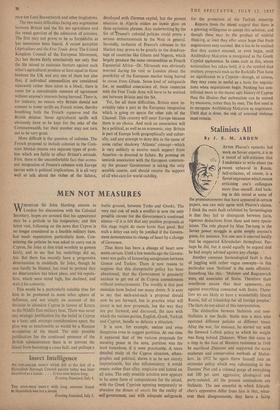MEN NOT MEASURES
WHENEVER Sir John Harding returns to London for discussions with the Colonial Secretary, hopes are aroused that his appearance may be a prelude to his resignation; and this latest visit, following on the news that Cyprus is no longer considered as a feasible military base, has made expectation particularly keen. Con- sidering the policies he was asked to carry out in Cyprus, Sir John at first tried worthily to govern fairly, and to see that his underlings did so, too. But there has recently been a progressive deterioration in standards. Sir John, though he can hardly be blamed, has tried to pretend that no deterioration has taken place, and his reputa- tion, which once stood high, has declined, and with it his authority.
This would be a particularly suitable time for him to be promoted to some other sphere of influence, and not simply on account of the decision to abandon Cyprus in favour of Kenya as the Middle East military base. There was never any strategic justification for the belief in Cyprus as a base; and, strategic considerations apart, the plan was as indefensible as would be a Russian occupation of the island. The only possible justification for the continued presence of the British administration there is to prevent the island from becoming a casus belli, and perhaps a battle ground, between Turks and Greeks. The very real risk of such a conflict is now the only possible excuse for the Government's continued silence—if it is felt that any positive proposals at this stage might do more harm than good. But such a delay can only be justified if the Govern- ment demonstrates its change of heart by a change of Governor.
That there has been a change of heart now seems certain. Until a few months ago the Govern- ment was guilty of fomenting antagonism between Greece and Turkey. There is now reason to suppose that this disreputable policy has been abandoned; that the Government is genuinely anxious to get out of its Cyprus commitments without embarrassment. The trouble is that past mistakes have locked too many doors. It is easy to say that such-and-such a proposal should now be put forward, but in practice what will count is not new proposals, but the way they are put forward, and discussed; the care with which the various parties, English, Greek, Turkish and Cypriot, handle so delicate a situation. '
It is now, for example, useless and even dangerous even to suggest partition. At one time it appeared that of the various proposals for securing peace in the area, partition was the least hazardous, if it were practicable. A more detailed study of the Cyprus situation, ethno- graphic and political, shows it to be not merely impracticable, but also inflammatory; it would create, rather than allay, suspicion and hatred on all sides. The only possible solution now appears to be some form of independence for the island, with the Greek Cypriots agreeing temporarily to abandon the dream of ennsis for the reality of self-government, and with adequate safeguards for the protection of the Turkish minority.
Reports from the island suggest that there is a growing willingness to accept this solution; and though these may be the product of wishful thinking, at least they offer some hope that fresh negotiations may succeed. But it has to be realised that they cannot succeed, or even begin, until Archbishop Makarios is recognised as the Greek Cypriot spokesman. In cases such as this, where nationalism has taken hold, it is the symbol that matters; proposals such as the Radcliffe Plan have no significance to a Cypriot—though, of course, they may come in useful as a basis for negotia- tions when negotiations begin. Nothing has con- tributed more to the recent ugly history of Cyprus than the illusion that nationalists can be moved by measures, rather than by men. The first need is to recognise Archbishop Makarios as negotiator. Until that is done, the risk of renewed violence must remain.














































 Previous page
Previous page